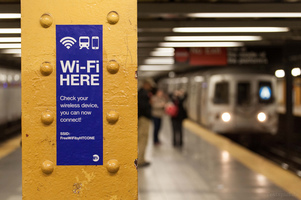Hacking train Wi-Fi may expose passenger data and control systems
 Vulnerabilities on the Wi-Fi networks of a number of rail operators could expose customers' credit card information, according to infosec biz Pen Test Partners this week. The research was conducted over several years, said Pen Test's Ken Munro. "In most cases they are pretty secure, although whether the Wi-Fi works or not is another matter," he added.
Vulnerabilities on the Wi-Fi networks of a number of rail operators could expose customers' credit card information, according to infosec biz Pen Test Partners this week. The research was conducted over several years, said Pen Test's Ken Munro. "In most cases they are pretty secure, although whether the Wi-Fi works or not is another matter," he added.
But in a handful of cases Munro was able to bridge the wireless network to the wired network and find a database server containing default credentials, enabling him to access the credit card data of customers paying for the Wi-Fi, including the passenger's name, email address and card details.
Read moreA flaw in Hotspot Shield can expose VPN users, locations
 A security researcher has found a way to identify users of Hotspot Shield, a popular free virtual private network service that promises its users anonymity and privacy.
A security researcher has found a way to identify users of Hotspot Shield, a popular free virtual private network service that promises its users anonymity and privacy.
Hotspot Shield, developed by AnchorFree, has an estimated 500 million users around the world relying on its privacy service. By bouncing a user's internet and browsing traffic through its own encrypted pipes, the service makes it harder for others to identify individual users and eavesdrop on their browsing habits. But an information disclosure bug in the privacy service results in a leak of user data, such as which country the user is located, and the user's Wi-Fi network name, if connected.
Read moreWPA3 is coming this year to enhance Wi-Fi router security
 At last, Wi-Fi security -- or lack of -- is about to get its day in the sun. The Wi-Fi Alliance, an industry body made up of device makers including Apple, Microsoft, and Qualcomm, announced Monday its next-generation wireless network security standard, WPA3.
At last, Wi-Fi security -- or lack of -- is about to get its day in the sun. The Wi-Fi Alliance, an industry body made up of device makers including Apple, Microsoft, and Qualcomm, announced Monday its next-generation wireless network security standard, WPA3.
The standard will replace WPA2, a near-two decades-old security protocol that's built in to protect almost every wireless device today -- including phones, laptops, and the Internet of Things. One of the key improvements in WPA3 will aim to solve a common security problem: open Wi-Fi networks. Seen in coffee shops and airports, open Wi-Fi networks are convenient but unencrypted.
Read moreStarbucks Wi-Fi hijacked people's laptops to mine cryptocurrency
 When Stensul CEO Noah Dinkin visited a Starbucks in Buenos Aires recently, he probably didn’t expect to be served some sneaky cryptocurrency miner code along with his coffee. But thanks to the store’s internet provider, that’s exactly what he got.
When Stensul CEO Noah Dinkin visited a Starbucks in Buenos Aires recently, he probably didn’t expect to be served some sneaky cryptocurrency miner code along with his coffee. But thanks to the store’s internet provider, that’s exactly what he got.
“Hi Starbucks, did you know that your in-store wifi provider in Buenos Aires forces a 10 second delay when you first connect to the wifi so it can mine bitcoin using a customer's laptop?” Dinkin tweeted on December 2. “Feels a little off-brand.” Dinkin wrote that Bitcoin was the digital currency being mined, but CoinHive, the company that provided the code for the miner, only works with Monero, a competing coin.
Read moreThe train is watching you!
 Even in the 2000s, when you stepped onto a bus or train and looked around, you saw people reading books and newspapers, for the most part. Fast-forward 10 years, and now 9 in 10 are looking at their smartphones or tablets, either chatting in WhatsApp or Telegram, or browsing through Facebook, Instagram, or Snapchat, liking kittens, food shots, selfies on the beach, and whatnot.
Even in the 2000s, when you stepped onto a bus or train and looked around, you saw people reading books and newspapers, for the most part. Fast-forward 10 years, and now 9 in 10 are looking at their smartphones or tablets, either chatting in WhatsApp or Telegram, or browsing through Facebook, Instagram, or Snapchat, liking kittens, food shots, selfies on the beach, and whatnot.
You probably use social networks on the go as well. Having a powerful mobile device and always being connected is very handy: It means in addition to using social networks, you can do online banking with a couple of taps, get a taxi, buy a new scarf, and do a lot of other things.
Read moreGoogle is receiving Android users’ locations even location services are off
 This is bad. Google actively receives location data from Android users even when location services have been switched off. Starting from early 2017, Android phones have been gathering addresses of nearby cellular towers and sending this data back to Google. The most troubling part is that this has been going on even when users have disabled location services.
This is bad. Google actively receives location data from Android users even when location services have been switched off. Starting from early 2017, Android phones have been gathering addresses of nearby cellular towers and sending this data back to Google. The most troubling part is that this has been going on even when users have disabled location services.
According to the publication, Android handsets collected location data pretty much all the time and subsequently relayed all stored information back to Google once connected to the internet. Quarts claims that all modern Android phones are affected by this vulnerability.
Read more41 percent of Android phones are vulnerable to 'devastating' Wi-Fi attack
 A new exploit can allow attackers to read Wi-Fi traffic between devices and wireless access points, and even modify it to inject malware into websites. Researchers have started disclosing security vulnerabilities, and it looks like Android and Linux-based devices are the worst affected by them.
A new exploit can allow attackers to read Wi-Fi traffic between devices and wireless access points, and even modify it to inject malware into websites. Researchers have started disclosing security vulnerabilities, and it looks like Android and Linux-based devices are the worst affected by them.
Researchers also claim some of the attack works against all modern Wi-Fi networks using WPA or WPA 2 encryption, and that the weakness is in the Wi-Fi standard itself so it affects macOS, Windows, iOS, Android, and Linux devices. Intercepting traffic lets attackers read information that was previously assumed to be safely encrypted.
Read more'All Wi-Fi networks' are vulnerable to hacking, security expert discovers
 The security protocol used to protect the vast majority of wifi connections has been broken, potentially exposing wireless internet traffic to malicious eavesdroppers and attacks, according to the researcher who discovered the weakness.
The security protocol used to protect the vast majority of wifi connections has been broken, potentially exposing wireless internet traffic to malicious eavesdroppers and attacks, according to the researcher who discovered the weakness.
Mathy Vanhoef, a security expert at Belgian university KU Leuven, discovered the weakness in the wireless security protocol WPA2, and published details of the flaw on Monday morning. “Attackers can use this novel attack technique to read information that was previously assumed to be safely encrypted, this can be abused to steal sensitive information.” Vanhoef’s report said.
Read moreTfL plans to make £322m by collecting data from passengers' mobiles via Tube Wi-Fi
 Transport for London plans to make £322m by collecting Tube users' location data and potentially selling it to third parties. At the end of 2016, TfL ran a pilot which tracked the Wi-Fi signals from 5.6 million phones as people moved around the London Underground, even if they weren't connected to a Wi-Fi network.
Transport for London plans to make £322m by collecting Tube users' location data and potentially selling it to third parties. At the end of 2016, TfL ran a pilot which tracked the Wi-Fi signals from 5.6 million phones as people moved around the London Underground, even if they weren't connected to a Wi-Fi network.
TfL publicly stated that the purpose of the scheme was to use the aggregated, anonymised data "to better understand how people navigate the London Underground network, allowing TfL to improve the experience for customers". It is now in consultation about tracking passengers on a permanent basis.
Read moreHackers are using NSA hacking tool to attack hotels in Europe
 Russian-speaking cyberespionage group APT28, also known as Sofacy, is believed to be behind a series of attacks last month against travelers staying in hotels in Europe and the Middle East. APT28 notably used the NSA hacking tool EternalBlue as part of its scheme to steal credentials from business travelers, according to a report released Friday by security firm FireEye.
Russian-speaking cyberespionage group APT28, also known as Sofacy, is believed to be behind a series of attacks last month against travelers staying in hotels in Europe and the Middle East. APT28 notably used the NSA hacking tool EternalBlue as part of its scheme to steal credentials from business travelers, according to a report released Friday by security firm FireEye.
One of the goals of the attack is to trick guests to download a malicious document masquerading as a hotel reservation form that, if opened and macros are enabled, installs a dropper file that ultimately downloads malware called Gamefish.
Read moreAxarhöfði 14,
110 Reykjavik, Iceland















